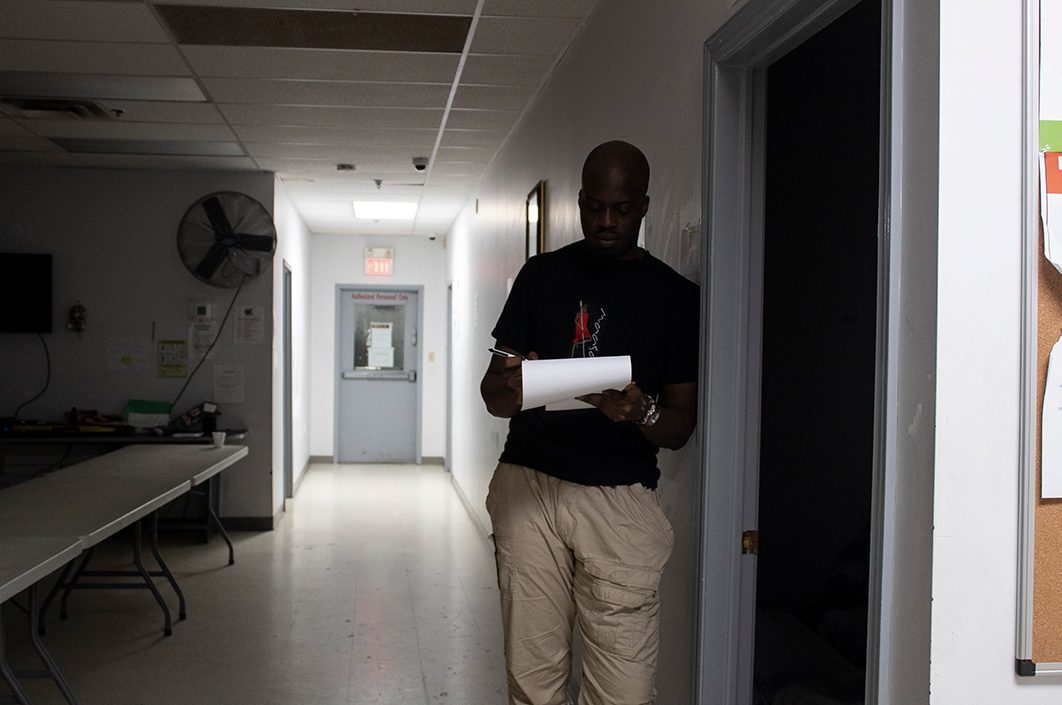It’s 4:30 a.m. at the Warden Woods Community 24-Hour Respite Site in Scarborough. Initially intended as emergency temporary care for the homeless community, the centre has grown to become a permanent shelter for many in need.
Dimmed lights and hushed murmurs bolster the melancholic mood that fills the common area shared by the tenants and supervised by the night staff.
One elderly tenant settled at the dining table is close to tears as she waits for the other residents to wake up.
She suffers from a condition that causes her legs and ankles to swell, which means she can’t get up from the low-rise beds at Warden Woods on her own. Her son, also a tenant here, usually helps her. But he leaves for work at 4 a.m., so she is forced to wake early every day.
Jeff Ndombi, the overnight manager of the respite site, sees situations like this all the time. He quietly comforts her with words of support.
“But what can I really say?” he says. “It is very frustrating to not have solutions.”
Ndombi, a 29-year-old social worker with a background in finance and teaching, never planned on running a homeless shelter. But he was unhappy with a career crunching numbers in high-rises, and has since found solace helping others.

“The intoxicated people are up, the people with extreme mental health issues are up. And it’s my responsibility to make sure they fit the energy of the respite.”
– Jeff Ndombi
He sees the night staff’s role as distinctly different from that of the morning staff’s, comparing it to a time for damage control and therapy.
“What I’ll say about the night shift over here is that it’s like when the full moon is up,” he says. “It’s when all the oddballs are awake and roaming around. The intoxicated people are up, the people with extreme mental health issues are up. And it’s my responsibility to make sure they fit the energy of the respite.”
Rovena Campbell, another night staffer, explained how compassion is an important aspect of the job.
“Everyone always forgets that they’re people too,” she says. “Doing something as little as bringing a cake on their birthdays can make all the difference.”
However, both she and Ndombi stressed that sometimes just compassion is not enough. With the exception of providing food and a bed to sleep in, they don’t have the resources or training needed to combat mental health problems or issues facing the older generations.
The City of Toronto’s 2018 Street Needs Assessment Report found that more than half of people experiencing homelessness report at least one type of physical or mental health condition. This was particularly high among 24-hour respite site respondents, at 76 percent. The report also found that a greater share of seniors stays in 24-hour respite sites as well as in city-administered shelters.
Running a shelter under such circumstances necessitate a firm hand. However, even for an experienced night manager, diffusing high-pressure situations can be intimidating. Ndombi describes a time when an older gentleman arrived with a razor in his throat and was nearly choking to death when he showed up to the respite site. Ndombi’s quick response in calling emergency services ended up saving his life.
“If anything was to go wrong, then I’m the one who has to take all responsibility,” says Ndombi. “Even if it’s pretty calm, it’s like, any night something could happen.”
Check out more Toronto at 4 a.m. content here!
Online: Toronto Observer
Instagram: @6ix_at_4
Twitter: @6ix_at_4
Facebook: @6ixat4

